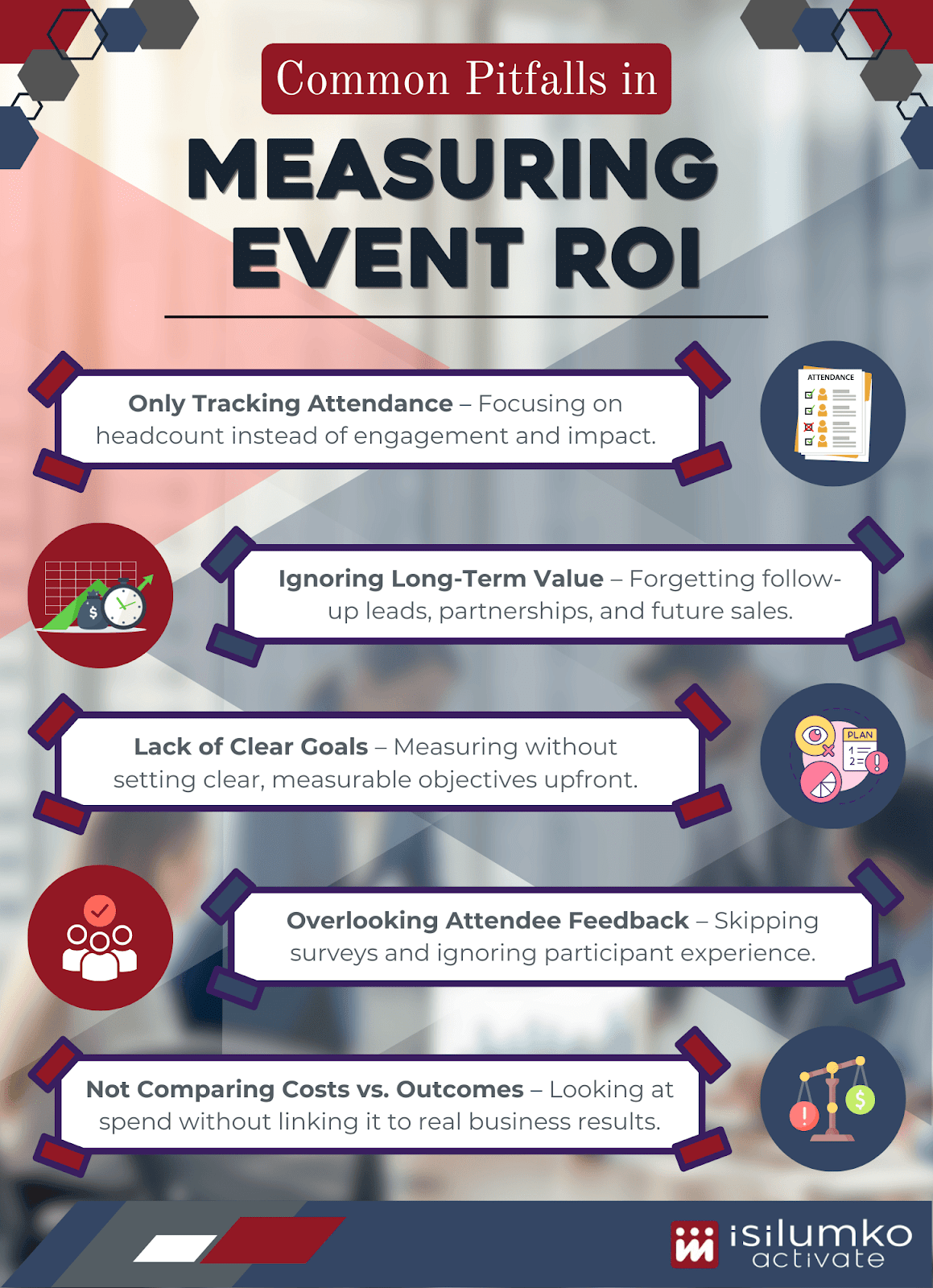So, the event’s over—lights are out, attendees are gone. Now what? This is when event ROI measurement comes in. It gives you the clearest picture of whether your investment actually paid off and whether your conference was truly a successful event.
In South Africa, knowing ROI means smarter event planning, greater confidence for clients, and a stronger case for why your team should host the next event. And when it comes to turning numbers into insights, Isilumko Activate is a trusted partner. With 26 years of experience, a BBBEE Level 1 status, and a proud heritage in event management and event marketing, they deliver high-quality event solutions backed by measurable results.

Why Post-Event Analysis Matters
Post-event analysis is not just about reports; it’s about transformation. Think of it as the roadmap for your future event strategies.
- Quick Answer: ROI shows how much value you generated from the event compared to what you spent.
- Why it Matters: When you can measure event success in numbers and experiences, you prove the value to sponsors, partners, and your own business.
- Local Insight: For South African businesses, ROI helps with smarter budgeting, securing sponsors, and reassuring stakeholders that event organizers made the right decisions.
Understanding Event ROI and Success Metrics
So, what exactly is event ROI? In simple terms, it’s the return on investment from your conference or activation. It’s about measuring ROI in both money and impact.
But ROI is not the only metric that matters. Conference success metrics stretch way beyond event revenue:
- Engagement: Were attendees actively participating?
- Leads & Sales: Did you generate business opportunities?
- Awareness: Did more people know about your brand?
- Partnerships: Did the event experience open doors for collaborations?
Setting clear event goals upfront makes it so much easier to measure success later. Without goals, you can’t truly assess event outcomes or compare performance across a different event or event type.
Key Metrics Every Event Manager Should Track
Here’s a guide for event professionals on the most useful event metrics:
- Attendance & Registration: How many attendees showed up compared to registrations.
- Attendee Engagement: Did attendees interact, ask questions, or download resources?
- Attendee Satisfaction: Use post-event surveys to check if expectations were met.
- Lead Generation: How many contacts were generated from the event.
- Social Media Engagement: Shares, likes, and mentions across platforms.
- Speaker Feedback: Did attendees value the talks?
- Sponsorship ROI: Were sponsors satisfied with visibility and leads?
These metrics to measure help you measure event success in more than one way. For event marketers, this paints a clear picture of success and shows the true event value.
How to Measure Event Success with ROI Effectively
Let’s talk about the numbers.
ROI=Event Revenue-Event Expenses/Event Expenses × 100
Example: If your total event costs were R100,000 and you earned R150,000, your ROI = 50%.
- ROI calculation gives clarity.
- Tools make roi tracking and roi analysis much easier.
- Measuring event ROI ensures you stay on budget and optimize for the future event.
Key takeaway: When you calculate ROI, you don’t just look at financials—you look at the event’s ROI holistically, considering attendee satisfaction and engagement.
Event Tech That Simplifies ROI Tracking
Modern event technology and event management software make it easier than ever to measure impact.
- Event apps: Gather feedback instantly.
- Event platform dashboards: Real-time event data and reporting.
- Event management platforms: Integrate ticketing, check-ins, and event analytics.
Comparison:
- Manual tracking: Slow, error-prone, difficult for event managers.
- Event tech: Automated reporting, live engagement dashboards, easy post-event surveys.
Simply put, event tech ensures a comprehensive event review with fewer headaches.
Post-Event Analysis in Action
Here’s a step-by-step guide to ROI tracking after the event:
- Revisit event goals – Were objectives achieved?
- Collect data – Use surveys, event apps, and event platform analytics.
- Conduct ROI analysis – Compare event expenses and event revenue.
- Share insights – Present ROI to sponsors and stakeholders.
- Plan the next event – Use lessons for future event strategies.
Example Questions About Event performance:
- How would you rate the overall event experience?
- Was networking beneficial?
- Would you be recommending the event to others?
This structured event lifecycle review helps you measure the success and optimize your overall event outcomes.
Common Pitfalls in Measuring Event ROI

Why Isilumko Activate is the Best Fit for Post-Event Analysis
Looking for the best in event ROI measurement in South Africa? Here’s why Isilumko Activate stands out:
- Proven experience – Over 26 years in event management and event marketing.
- Transparent ROI reporting – With clear ROI insights and easy roi calculation.
- Cutting-edge event technology – From event apps to full event management platforms.
- Strong reputation – Multi-award-winning and trusted by top brands.
- Local expertise – Personalized insights tailored for South African markets.
Quick comparison: While other agencies give generic reports, Isilumko delivers ROI effectively—actionable insights that help you optimize your event for financial success and stronger event outcomes.
Trust & Reputation Signals
Trust matters in event partnerships. Isilumko Activate is recognized on leading directories, holds industry awards, and has glowing reviews from event organizers and clients alike.
- Featured in media and professional listings.
- Known for high-quality event delivery across five major cities.
- Endorsed by brands who trust them for modern event execution.
Frequently Asked Questions (FAQs)
1. How do I measure the success of your event?
The event’s success can be tracked by looking at key event KPIs like attendee satisfaction, lead generation, and engagement. These metrics are used to measure how well your goals were achieved, no matter the type of event.
2. Does ROI apply to a virtual event as much as an in-person one?
Absolutely! Whether it’s a virtual event or a live conference, the same event elements—like registrations, engagement, and sponsorship value—help you learn how to measure ROI. The difference lies in the event format, but the core principles of tracking the impact and ROI remain the same.
3. What is considered a good or average ROI for conferences?
The average ROI varies depending on the event relative to its size, goals, and budget. Some events see higher returns from sponsorships, while others gain more from attendee engagement or sales. The key is aligning the event offers with what success looks like for your business.
4. Why is post event analysis so important?
Because it connects your efforts to real results. By reviewing event elements and event KPIs, you can identify strengths, improve weak areas, and set benchmarks for the event’s success. This process helps guide smarter planning for your next conference.
Turning Data Into Future Success
A successful event doesn’t end when the doors close. Post-event analysis is the engine that drives future event success. With smart roi tracking, proper event metrics, and professional support, you can measure event success, refine strategies, and grow your impact.
Isilumko Activate helps businesses treat roi analysis not just as reporting, but as a tool for future event strategies. Their expertise ensures that every event delivers measurable event value and clear results.

Ready to turn your next conference into a growth-driven success story? Work with Isilumko Activate for expert event ROI calculation, smarter event planning, and impactful results. Visit their website today to connect with a team that understands how to maximize the roi of events.





